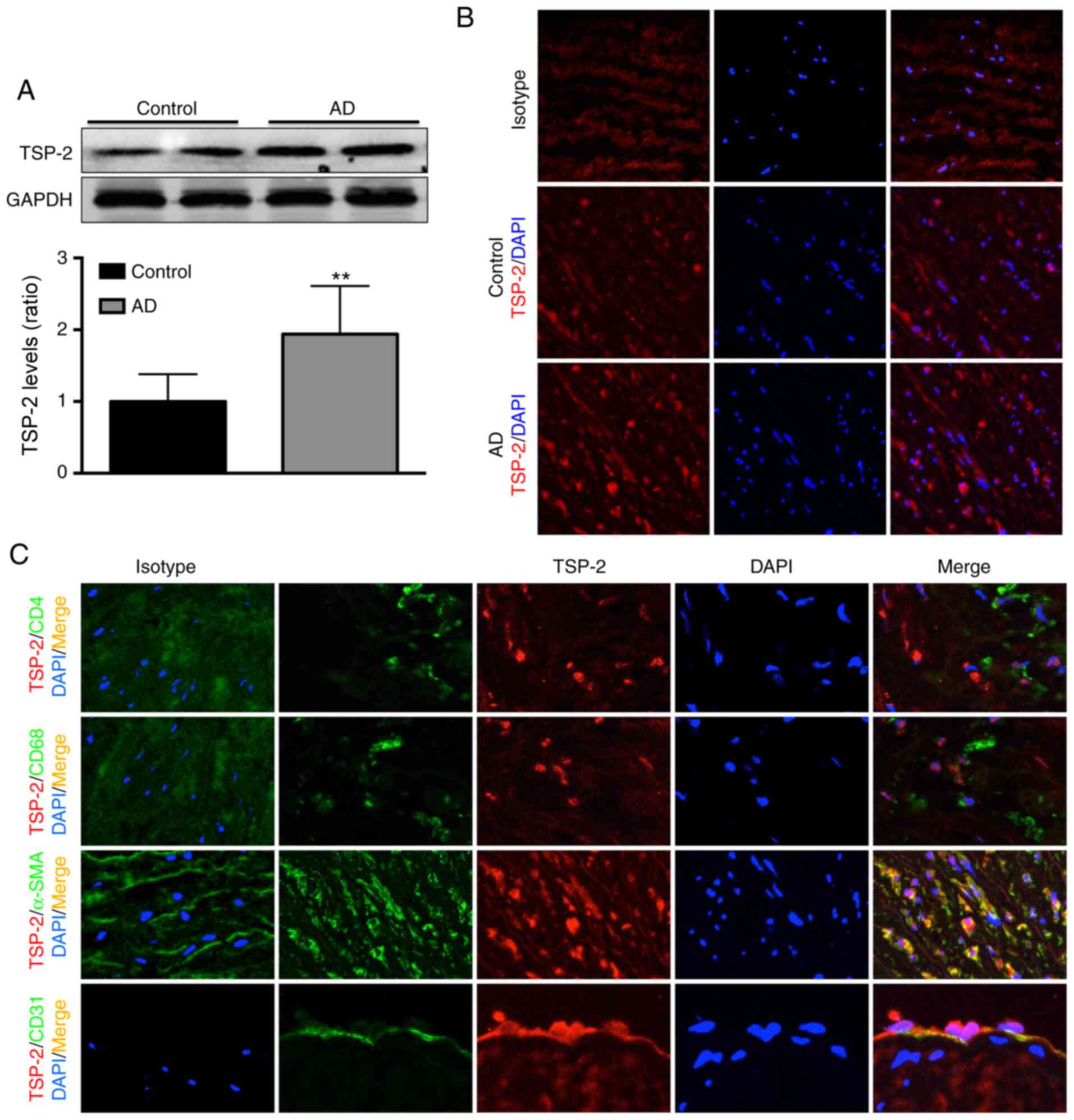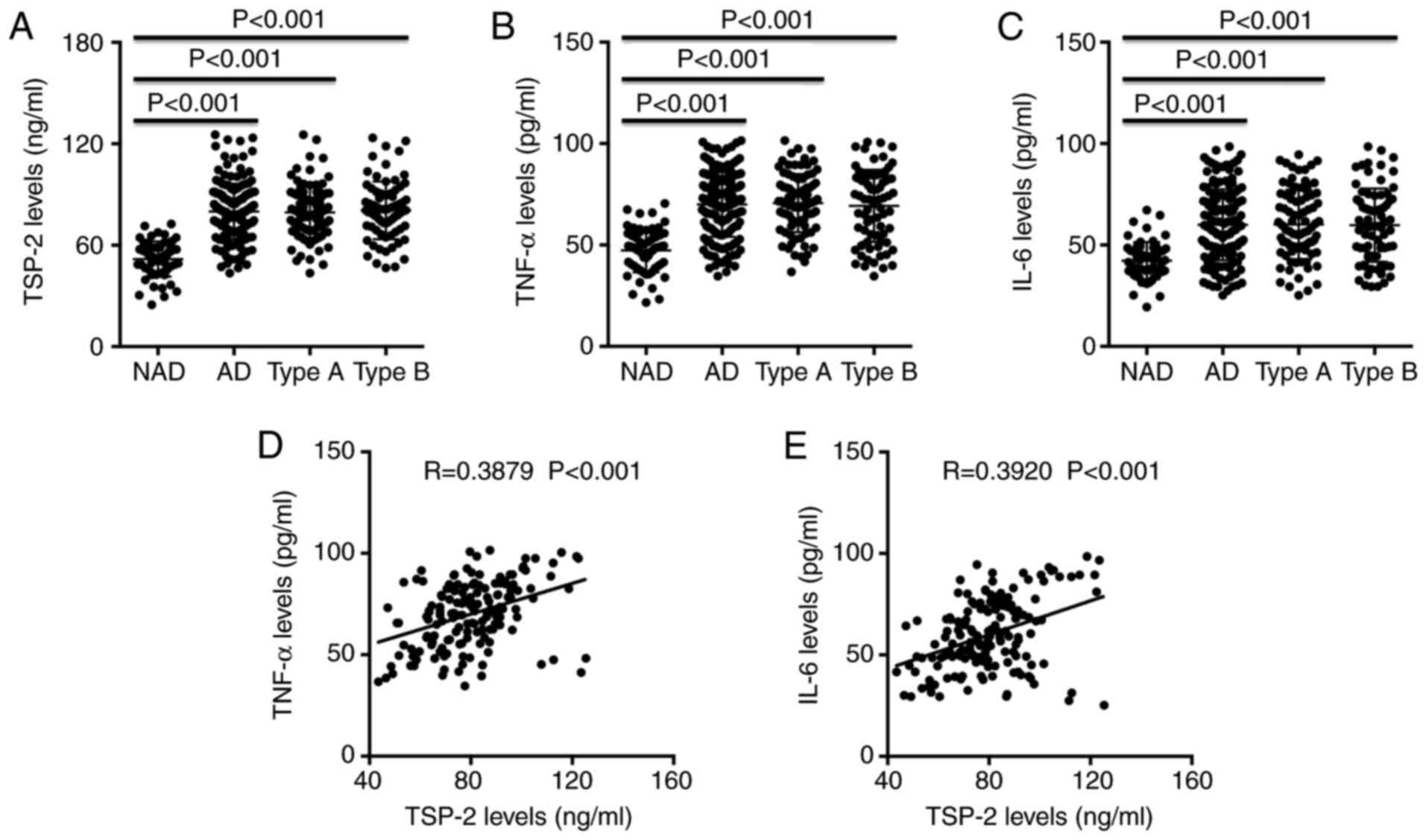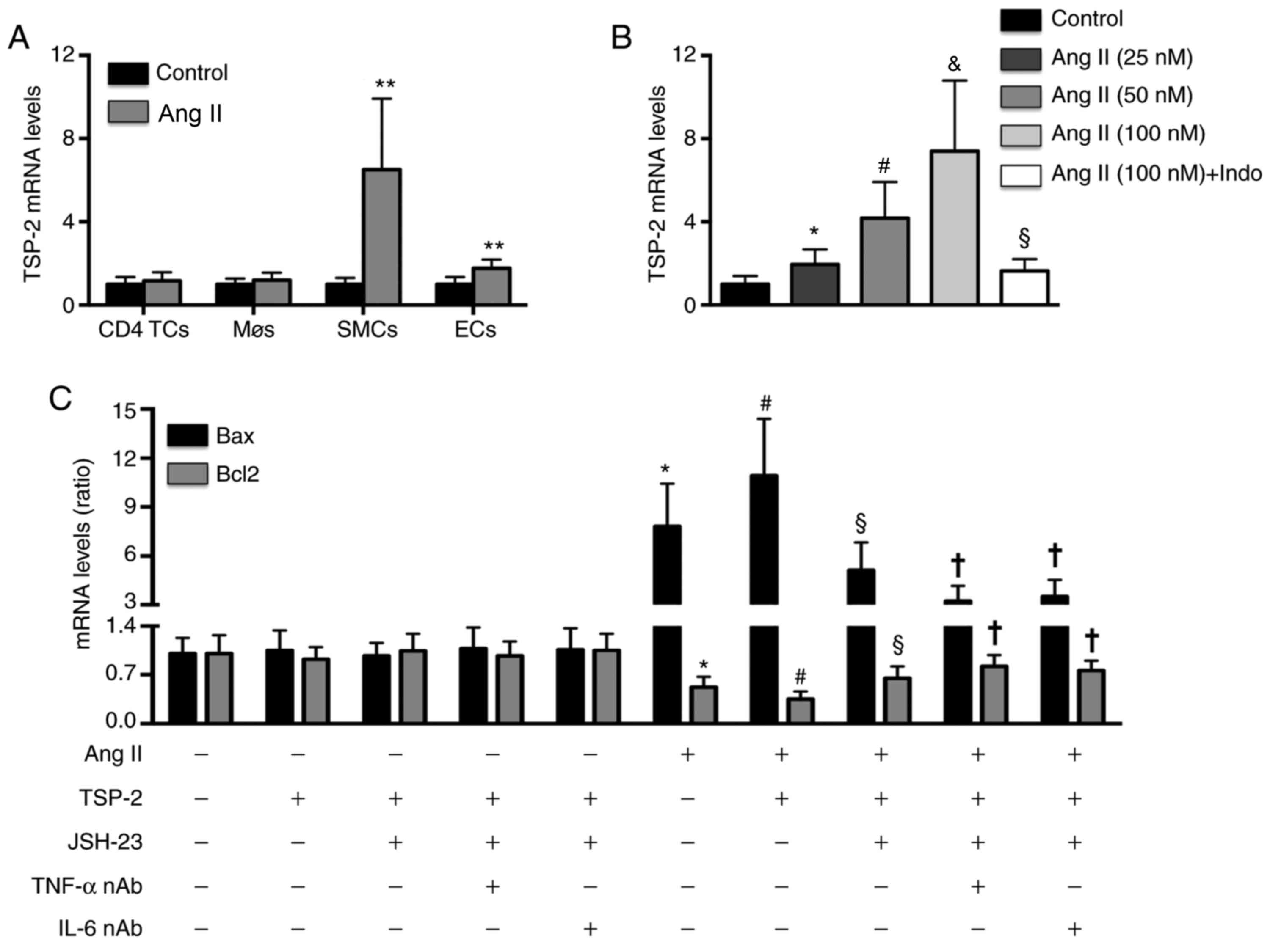|
1
|
Hagan PG, Nienaber CA, Isselbacher EM,
Bruckman D, Karavite DJ, Russman PL, Evangelista A, Fattori R,
Suzuki T, Oh JK, et al: The international registry of acute aortic
dissection (IRAD): New insights into an old disease. JAMA.
283:897–903. 2000.PubMed/NCBI View Article : Google Scholar
|
|
2
|
Chen LW, Wu XJ, Lu L, Zhang GC, Yang GF,
Yang ZW, Dong Y, Cao H and Chen Q: Total arch repair for acute type
A aortic dissection with 2 modified techniques: Open
single-branched stent graft placement and reinforcement of the
dissected arch vessel stump with stent graft. Circulation.
123:2536–2541. 2011.PubMed/NCBI View Article : Google Scholar
|
|
3
|
Fattori R, Cao P, De Rango P, Czerny M,
Evangelista A, Nienaber C, Rousseau H and Schepens M:
Interdisciplinary expert consensus document on management of type B
aortic dissection. J Am Coll Cardiol. 61:1661–1678. 2013.PubMed/NCBI View Article : Google Scholar
|
|
4
|
Hugo C and Daniel C: Thrombospondin in
renal disease. Nephron Exp Nephrol. 111:e61–e66. 2009.PubMed/NCBI View Article : Google Scholar
|
|
5
|
Calabro NE, Kristofik NJ and Kyriakides
TR: Thrombospondin-2 and extracellular matrix assembly. Biochim
Biophys Acta. 1840:2396–2402. 2014.PubMed/NCBI View Article : Google Scholar
|
|
6
|
Rusnati M, Borsotti P, Moroni E, Foglieni
C, Chiodelli P, Carminati L, Pinessi D, Annis DS, Paiardi G,
Bugatti A, et al: The calcium-binding type III repeats domain
ofthrombospondin-2 binds to fibroblast growth factor 2 (FGF2).
Angiogenesis. 22:133–144. 2019.PubMed/NCBI View Article : Google Scholar
|
|
7
|
Morris AH, Stamer DK, Kunkemoeller B,
Chang J, Xing H and Kyriakides TR: Decellularized materials derived
from TSP2-KO mice promote enhanced neovascularization and
integration in diabetic wounds. Biomaterials. 169:61–71.
2018.PubMed/NCBI View Article : Google Scholar
|
|
8
|
Helkin A, Maier KG and Gahtan V:
Thrombospondin-1, -2 and -5 have differential effects on vascular
smooth muscle cell physiology. Biochem Biophys Res Commun.
464:1022–1027. 2015.PubMed/NCBI View Article : Google Scholar
|
|
9
|
Daniel C, Vogelbacher R, Stief A, Grigo C
and Hugo C: Long-term gene therapy with thrombospondin 2 inhibits
TGF-β activation, inflammation and angiogenesis in chronic
allograft nephropathy. PLoS One. 8(e83846)2013.PubMed/NCBI View Article : Google Scholar
|
|
10
|
Papageorgiou AP, Swinnen M, Vanhoutte D,
VandenDriessche T, Chuah M, Lindner D, Verhesen W, de Vries B,
D'hooge J, Lutgens E, et al: Thrombospondin-2 prevents cardiac
injury and dysfunction in viral myocarditis through the activation
of regulatory T-cells. Cardiovasc Res. 94:115–124. 2012.PubMed/NCBI View Article : Google Scholar
|
|
11
|
Li K, Huang EP, Su J, Zhu P, Lin J, Luo SQ
and Yang CL: Therapeutic role for TSP-2 antibody in a murine asthma
model. Int Arch Allergy Immunol. 175:160–170. 2018.PubMed/NCBI View Article : Google Scholar
|
|
12
|
Kimura Y, Izumiya Y, Hanatani S, Yamamoto
E, Kusaka H, Tokitsu T, Takashio S, Sakamoto K, Tsujita K, Tanaka
T, et al: High serum levels of thrombospondin-2 correlate with poor
prognosis of patients with heart failure with preserved ejection
fraction. Heart Vessels. 31:52–59. 2016.PubMed/NCBI View Article : Google Scholar
|
|
13
|
Hanatani S, Izumiya Y, Takashio S, Kimura
Y, Araki S, Rokutanda T, Tsujita K, Yamamoto E, Tanaka T, Yamamuro
M, et al: Circulating thrombospondin-2 reflects disease severity
and predicts outcome of heart failure with reduced ejection
fraction. Circ J. 78:903–910. 2014.PubMed/NCBI View Article : Google Scholar
|
|
14
|
Golledge J, Clancy P, Hankey GJ and Norman
PE: Relation between serum thrombospondin-2 and cardiovascular
mortality in older men screened for abdominal aortic aneurysm
aneurysm. Am J Cardiol. 111:1800–1804. 2013.PubMed/NCBI View Article : Google Scholar
|
|
15
|
van Almen GC, Swinnen M, Carai P, Verhesen
W, Cleutjens JP, D'hooge J, Verheyen FK, Pinto YM, Schroen B,
Carmeliet P and Heymans S: Absence of thrombospondin-2 increases
cardiomyocyte damage and matrix disruption in doxorubicin-induced
cardiomyopathy. J Mol Cell Cardiol. 51:318–328. 2011.PubMed/NCBI View Article : Google Scholar
|
|
16
|
Swinnen M, Vanhoutte D, Van Almen GC,
Hamdani N, Schellings MW, D'hooge J, Van der Velden J, Weaver MS,
Sage EH, Bornstein P, et al: Absence of thrombospondin-2 causes
age-related dilated cardiomyopathy. Circulation. 120:1585–1597.
2009.PubMed/NCBI View Article : Google Scholar
|
|
17
|
Xiao L, Kirabo A, Wu J, Saleh MA, Zhu L,
Wang F, Takahashi T, Loperena R, Foss JD, Mernaugh RL, et al: Renal
denervation prevents immune cell activation and renal inflammation
in angiotensin II-induced hypertension. Circ Res. 117:547–557.
2015.PubMed/NCBI View Article : Google Scholar
|
|
18
|
Li Y, Zhang C, Wu Y, Han Y, Cui W, Jia L,
Cai L, Cheng J, Li H and Du J: Interleukin-12p35 deletion promotes
CD4 T-cell-dependent macrophage differentiation and enhances
angiotensin II-Induced cardiac fibrosis. Arterioscler Thromb Vasc
Biol. 32:1662–1674. 2012.PubMed/NCBI View Article : Google Scholar
|
|
19
|
Lake FR, Noble PW, Henson PM and Riches
DW: Functional switching of macrophage responses to tumor necrosis
factor-alpha (TNF alpha) by interferons. Implications for the
pleiotropic activities of TNF alpha. J Clin Invest. 93:1661–1669.
1994.PubMed/NCBI View Article : Google Scholar
|
|
20
|
Golovina VA and Blaustein MP: Preparation
of primary cultured mesenteric artery smooth muscle cells for
fluorescent imaging and physiological studies. Nat Protoc.
1:2681–2687. 2006.PubMed/NCBI View Article : Google Scholar
|
|
21
|
Jia LX, Zhang WM, Zhang HJ, Li TT, Wang
YL, Qin YW, Gu H and Du J: Mechanical stretch-induced endoplasmic
reticulum stress, apoptosis and inflammation contribute to thoracic
aortic aneurysm and dissection. J Pathol. 236:373–383.
2015.PubMed/NCBI View Article : Google Scholar
|
|
22
|
Kobayashi M, Inoue K, Warabi E, Minami T
and Kodama T: A simple method of isolating mouse aortic endothelial
cells. J Atheroscler Thromb. 12:138–142. 2005.PubMed/NCBI View Article : Google Scholar
|
|
23
|
Ye J, Que B, Huang Y, Lin Y, Chen J, Liu
L, Shi Y, Wang Y, Wang M, Zeng T, et al: Interleukin-12p35 knockout
promotes macrophage differentiation, aggravates vascular
dysfunction, and elevates blood pressure in angiotensin II-infused
mice. Cardiovasc Res. 115:1102–1113. 2019.PubMed/NCBI View Article : Google Scholar
|
|
24
|
Bae ON, Wang JM, Baek SH, Wang Q, Yuan H
and Chen AF: Oxidative stress-mediated thrombospondin-2
upregulation impairs bone marrow-derived angiogenic cell function
in diabetes mellitus. Arterioscler Thromb Vasc Biol. 33:1920–1927.
2013.PubMed/NCBI View Article : Google Scholar
|
|
25
|
Xiao T, Zhang L, Huang Y, Shi Y, Wang J,
Ji Q, Ye J, Lin Y and Liu H: Sestrin2 increases in aortas and
plasma from aortic dissection patients and alleviates angiotensin
II-induced smooth muscle cell apoptosis via the Nrf2 pathway. Life
Sci. 218:132–138. 2019.PubMed/NCBI View Article : Google Scholar
|
|
26
|
Livak KJ and Schmittgen TD: Analysis of
relative gene expression data using real-time quantitative PCR and
the 2(-Delta Delta C(T)) method. Methods. 25:402–408.
2001.PubMed/NCBI View Article : Google Scholar
|
|
27
|
Pohjolainen V, Mustonen E, Taskinen P,
Näpänkangas J, Leskinen H, Ohukainen P, Peltonen T, Aro J, Juvonen
T, Satta J, et al: Increased thrombospondin-2 in human
fibrosclerotic and stenotic aortic valves. Atherosclerosis.
220:66–71. 2012.PubMed/NCBI View Article : Google Scholar
|
|
28
|
Ortega R, Collado A, Selles F,
Gonzalez-Navarro H, Sanz MJ, Real JT and Piqueras J: SGLT-2
(Sodium-Glucose Cotransporter 2) inhibition reduces Ang II
(Angiotensin II)-induced dissecting abdominal aortic aneurysm in
ApoE (Apolipoprotein E) knockout mice. Arterioscler Thromb Vasc
Biol. 39:1614–1628. 2019.PubMed/NCBI View Article : Google Scholar
|
|
29
|
Ye J, Wang Y, Wang Z, Ji Q, Huang Y, Zeng
T, Hu H, Ye D, Wan J and Lin Y: Circulating Th1, Th2, Th9, Th17,
Th22, and treg levels in aortic dissection patients. Mediators
Inflamm. 2018(5697149)2018.PubMed/NCBI View Article : Google Scholar
|
|
30
|
Zeng T, Shi L, Ji Q, Shi Y, Huang Y, Liu
Y, Gan J, Yuan J, Lu Z, Xue Y, et al: Cytokines in aortic
dissection. Clin Chim Acta. 486:177–182. 2018.PubMed/NCBI View Article : Google Scholar
|
|
31
|
El-Hamamsy I and Yacoub MH: Cellular and
molecular mechanisms of thoracic aortic aneurysms. Nat Rev Cardiol.
6:771–786. 2009.PubMed/NCBI View Article : Google Scholar
|
|
32
|
Suzuki T, Katoh H, Watanabe M, Kurabayashi
M, Hiramori K, Hori S, Nobuyoshi M, Tanaka H, Kodama K, Sato H, et
al: Novel biochemical diagnostic method for aortic dissection.
Results of a prospective study using an immunoassay of smooth
muscle myosin heavy chain. Circulation. 93:1244–1249.
1996.PubMed/NCBI View Article : Google Scholar
|
|
33
|
Michel JB, Jondeau G and Milewicz DM: From
genetics to response to injury: Vascular smooth muscle cells in
aneurysms and dissections of the ascending aorta. Cardiovasc Res.
114:578–589. 2018.PubMed/NCBI View Article : Google Scholar
|
|
34
|
Ye P, Chen W, Wu J, Huang X, Li J, Wang S,
Liu Z, Wang G, Yang X, Zhang P, et al: GM-CSF contributes to aortic
aneurysms resulting from SMAD3 deficiency. J Clin Invest.
123:2317–2331. 2013.PubMed/NCBI View
Article : Google Scholar
|
|
35
|
De Stefano D, Nicolaus G, Maiuri MC,
Cipolletta D, Galluzzi L, Cinelli MP, Tajana G, Iuvone T and
Carnuccio R: NF-kappaB blockade upregulates Bax, TSP-1, and TSP-2
expression in rat granulation tissue. J Mol Med (Berl). 87:481–492.
2009.PubMed/NCBI View Article : Google Scholar
|

















